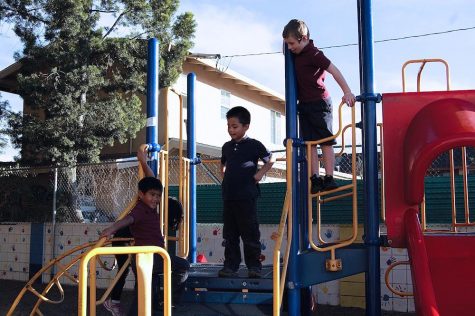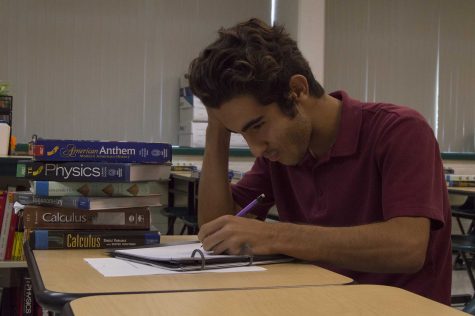A Self-Prescribed Digital Detox

I only took two bites of my dinner before a bright banner blinked on my cell phone, notifying me that someone liked my photo on Instagram. My dad eagerly clicked on the fast-forward button on the remote to return to his sports game as soon as possible. My mom laughed as she replied to a Facebook message from a high-school friend. The longest sentence exchanged so far was, “Pass the salad bowl please.” To the modern day Luddites’ horror, this scene in my household has happened countless times.
It’s undeniable that technology has found its place in every aspect of modern day life, even at the dinner table. As a teenager, checking my cell phone has become compulsive rather than something done out of necessity. When I wake up, my first impulse is to check the notifications that have accumulated overnight. Throughout the day, my phone remains no less than an arm’s distance from me and ready to use at a moment’s notice. As soon as I arrive home, I place my phone down, only to swap it out with the larger screen of either my iPad or laptop.
In an ever-advancing era of information and technology, smartphones, with their multitasking and Internet connection capabilities, have become a necessity to people of all ages. It is inevitable that we find ourselves glued to bright screens. According to the Huffington Post, the average smartphone user checks their device every six and a half minutes. Also, Time magazine’s international poll reported that 84% of people believed that they could not go one day without their cell phones. Ever since I received my first iPhone in 2010, I considered myself part of this majority.
We’re all aware of the age-old saying, “Too much of a good thing is bad.” Technology addictions have become more prevalent and are now been recognized by mental health professionals. According to The Telegraph, volunteers who stopped using technology for social networking purposes for one day developed symptoms of withdrawal such as feelings of anxiety and isolation, as if they were going on a diet or attempting to quit smoking.
“We’ve become so hooked on constant stimulation that we don’t know how to have any downtime,” said Susan Abraham, our school’s psychologist. “This can lead to issues such as sleeping disorders and shorter attention spans. We should limit our technology usage and challenge ourselves to have set periods of the day when we allow ourselves to do only one task, instead of multitasking.”
To combat the growing problem of overusing technology, psychologists worldwide have created “technology rehabilitations centers” to treat conditions such as Internet and video games addictions. Also, annual events such as National Day of Unplugging, held in the beginning of March, have been set up to encourage people to “unplug” from technology for 24 hours in order to better connect to their community. After reading testimonials from successful unpluggers, I was inspired to make my own changes.
I wanted to free myself from the shackles of my cellphone dependency. I loathed the fact that the empty feeling of a phoneless pocket prompted a sense of panic in me. What could I possibly be missing out on if I were to suddenly stop using my phone, or any other forms of technology? Out of curiosity, and perhaps a moment of courage, I decided to “go cold turkey” on technology usage, unless school-related, for one week.
Being the team player that I am, I encouraged my friends to accept the challenge with me. I was not surprised to find that none of my friends were willing to separate themselves from their screens for more than a day. Their incredulous looks when I told of them of my self-prescribed digital detox only further inspired me to defeat the challenge.
Monday, Oct. 14, the first day of the challenge, proved to me that the effects of a technology-free life weren’t too horrendous. I left my earphones at home so I wouldn’t be tempted to listen to music on the bus. I was more alert, and when I looked out the window I noticed the scenery more than usual. When I went to my weekly volunteering shift after school, I didn’t keep my phone in my pocket as I usually did. Not checking my phone for the time or new notifications every few minutes helped me feel like time went by more quickly.
The following day, I went straight home after school. Usually, as soon as I walked into the door I would eagerly turn on the television to catch up with my favorite shows through Netflix or check the news on social networking sites. Normally, I reserved one or two hours after school for quality time with my phone and laptop to unwind; however, sometimes I would become distracted for a couple more hours after that.
Junior Luis Sy gave me advice to keep myself from being distracted during this week. “Scatter all your books on your bed,” he said. “This way, you’ll be more inclined to start your homework rather than going on your phone or finding other distractions.” I took his advice and started my homework earlier. I was amazed to find that, without constantly receiving texts from my friends or liking pictures on Instagram, I was more productive and able to finish my homework three hours earlier than usual.
The next couple of days, not using technology began to be a pleasant experience and a choice rather than a limitation. Being away from the rings of cell phone notifications felt incredibly liberating. I loved not making myself available to be contacted every second of the day. I felt like I had more time to myself; I was able to read more books and even doodle in my previously abandoned sketchbook.
I also felt more connected to those around me. On the bus, I usually sit in silence with the person sitting next to me, both of us listening to our own music. This week, we actually conversed about our common interests. Also, when my parents and I ate dinner at a restaurant, I encouraged them to put their phones away as well. We were finally able to give our undivided attention to each other and spend genuine time together.
Even though I was upset about not watching the latest episode of The Walking Dead or my favorite Korean dramas, I didn’t think I was missing much after all. Not using technology taught me self-control and helped me manage my time more efficiently. Overall, my digital detox was an immensely rewarding experience. Perhaps the most rewarding part was checking my phone after a week to send a text to my friends saying “I did it.”







